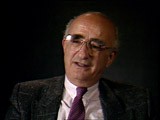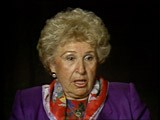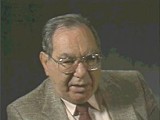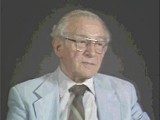<< Previous | Displaying results 2341-2350 of 2527 for "jewish" | Next >>
In 1936, David moved to Bucharest to live with his father. As Romania came under German influence, Romanian authorities introduced increasingly harsh measures against Jews. Antisemitic agitation increased and Jews came under attack in the streets of Bucharest and in other public places. David's father decided David should leave the country and arranged passage for him to Palestine. In December 1941, David left Romania from Constanta, a port city on the Black Sea, on the Struma, an old cattle boat. The…

In 1936, David moved to Bucharest to live with his father. As Romania came under German influence, Romanian authorities introduced increasingly harsh measures against Jews. Antisemitic agitation increased and Jews came under attack in the streets of Bucharest and in other public places. David's father decided David should leave the country and arranged passage for him to Palestine. In December 1941, David left Romania from Constanta, a port city on the Black Sea, on the Struma, an old cattle boat. The…

In 1933 Jerry's family moved from Hamburg to Amsterdam. The Germans invaded the Netherlands in 1940. In 1941, Jerry's brother perished in Mauthausen. Jerry and his parents went into hiding first in Amsterdam and then in a farmhouse in the south. The Gestapo (German Secret State Police) arrested Jerry's father in 1942, but Jerry and his mother managed to return to their first hiding place. They were liberated in Amsterdam by Canadian and Jewish Brigade troops.

In 1933 Jerry's family moved from Hamburg to Amsterdam. The Germans invaded the Netherlands in 1940. In 1941, Jerry's brother perished in Mauthausen. Jerry and his parents went into hiding first in Amsterdam and then in a farmhouse in the south. The Gestapo (German Secret State Police) arrested Jerry's father in 1942, but Jerry and his mother managed to return to their first hiding place. They were liberated in Amsterdam by Canadian and Jewish Brigade troops.

After invading the Netherlands in 1940, the Germans imposed anti-Jewish measures. With the aid of a Catholic priest who helped Jews find hiding places, Carla, her mother, and her brother went into hiding in August 1942 to avoid deportation to work camps. They had to leave the hiding place after three months and with the priest's help found shelter in Delft with a Catholic family which had seven children. They remained in hiding there for 30 months, until liberation in May 1945.

After the Germans invaded Poland in 1939, Dora's family fled to Vilna, Lithuania. When the Germans occupied Vilna, Dora's father was shot and the rest of the family was confined in the Vilna ghetto. Dora, her sister, and her mother were deported to the Kaiserwald camp in Latvia and then to the Stutthof concentration camp near Danzig. Her mother and sister perished in Stutthof. Dora herself was shot immediately before liberation, but she survived.

Miriam and her family fled their home when the Germans invaded Poland in 1939. They were interned by Soviet forces and deported to Siberia. Near the city of Tomsk, Miriam cut trees to earn food rations. When the Soviet Union went to war with Germany in June 1941, the Soviets released Miriam and her family. They sold their Red Cross rations for train fare and intended to return to Poland, but most of the family settled in Kazakhstan during the rest of the war. There, her father taught Hebrew to Jewish…

Shony was born to religious Jewish parents in a small Transylvanian city. He began to learn the violin at age 5. His town was occupied by Hungary in 1940 and by Germany in 1944. In May 1944, he was deported to the Auschwitz camp in Poland. He was transferred to the Natzweiler camp system in France and then to Dachau, where he was liberated by US troops in April 1945. In 1950, he immigrated to the United States, and became a composer and a professional violinist.

Like other Jews, the Lewents were confined to the Warsaw ghetto. In 1942, as Abraham hid in a crawl space, the Germans seized his mother and sisters in a raid. They perished. He was deployed for forced labor nearby, but escaped to return to his father in the ghetto. In 1943, the two were deported to Majdanek, where Abraham's father died. Abraham later was sent to Skarzysko, Buchenwald, Schlieben, Bisingen, and Dachau. US troops liberated Abraham as the Germans evacuated prisoners.

In 1939, as Chaim's tour in the Polish army was nearing its scheduled end, Germany invaded Poland. The Germans captured Chaim and sent him to Germany for forced labor. As a Jewish prisoner of war, Chaim later was returned to Poland. Ultimately, he was deported to the Sobibor camp, where the rest of his family died. In the 1943 Sobibor uprising, Chaim killed a guard. He escaped with his girlfriend, Selma, whom he later married. A farmer hid them until liberation by Soviet forces in June 1944.

We would like to thank Crown Family Philanthropies, Abe and Ida Cooper Foundation, the Claims Conference, EVZ, and BMF for supporting the ongoing work to create content and resources for the Holocaust Encyclopedia. View the list of donor acknowledgement.